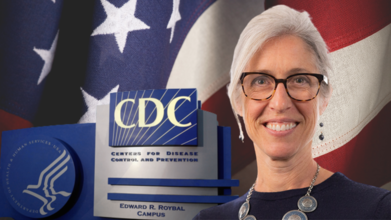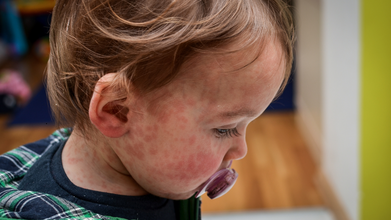- Health Conditions A-Z
- Health & Wellness
- Nutrition
- Fitness
- Health News
- Ayurveda
- Videos
- Medicine A-Z
- Parenting
'RFK Is Weaponizing Public Health': White House Sacks US CDC Director Susan Monarez Amid Vaccine Cuts

(Credit-2024 World Medical Innovation forum/CDC)
The White House has fired the director of the US Centers for Disease Control and Prevention (CDC), Susan Monarez. The White House stated that Monarez was "not aligned with the president's agenda." Her firing has created a lot of controversy. Monarez's lawyers quickly responded, saying she was not told about her removal and would not quit her job. They accused Health Secretary Robert F. Kennedy Jr. of targeting her because she refused to approve "unscientific, reckless directives." They also claimed Kennedy was "weaponizing public health."
Monarez is a scientist who specializes in infectious disease research. President Donald Trump nominated her, and she was confirmed by the Senate in July. She was the first CDC director in 50 years to not have a medical degree
What Are The New COVID-19 Vaccine Guidelines?
On the same day Monarez was fired, the Food and Drug Administration (FDA) approved new COVID-19 vaccines but with strict rules about who can get them. The vaccines will be available for all seniors, but not for younger adults and children who do not have other health problems. Health Secretary Kennedy commented on this, saying that the broad vaccine rules from the previous administration have now been "rescinded," or taken back.
Also Read: Egg Recall California 2025: How to Protect Yourself Amid Salmonella Cases
Monarez's firing is just one part of the problems at the CDC. Earlier this month, a union for CDC employees announced that about 600 workers had been fired. The people who lost their jobs worked on important topics like infectious diseases and environmental hazards. In addition, Monarez had recently been comforting staff after a gunman, who believed he was harmed by COVID-19 vaccines, attacked the CDC headquarters and killed a police officer.
Will COVID Vaccines Come To An End?
There have also been reports that the Trump administration might get rid of COVID-19 vaccines completely. Health Secretary Kennedy, who is well-known for being skeptical of vaccines, has already made a big move by pulling $500 million in federal funding from 22 projects that were developing new mRNA vaccines. He said these vaccines don't work well against respiratory infections. However, medical experts say his claims are false and that his actions could make people lose trust in science.
HHS has also announced a big change in how it invests in vaccine research. The department is moving away from funding mRNA vaccine projects and is instead focusing on what it calls "alternative" vaccine technologies. This shift has drawn criticism from scientists who say that mRNA technology was crucial to the rapid COVID-19 response and is a vital tool for fighting future pandemics.
Another major change was when Kennedy got rid of every member of the Advisory Committee on Immunization Practices (ACIP). This group had been advising the CDC for decades. Kennedy replaced them with a small, hand-picked group, claiming the old members had conflicts of interest. These changes have made many medical professionals confused and concerned. Some clinics and pharmacies are now unsure whether to offer certain vaccines to pregnant women or healthy children, and they don't know if insurance will cover them. While older people and those with health problems can still get vaccines, access has become less clear for healthy children and adults.
Erythritol Sweetener Could Be Linked To Stroke Risk, Finds Study

Credits: Canva
Erythritol sweetener, commonly found in most of the food we consume, whether it is a protein bar or energy drink could be linked to stroke risk. While it is considered as a safer alternative to sugar as a natural sweetener, a study from the University of Colorado suggests it could damage cells in the blood-brain barrier.
The blood-brain barrier is brain's security system that keeps the harmful substance off the limits, while letting in nutrients. Research also suggests that it would lead to serious consequences for heart health and stroke risk.
Erythritol Sweetener Risk: What Did The Study Find?
In the latest study, researchers exposed cells that form the blood–brain barrier to erythritol levels typically seen after consuming a soft drink sweetened with the compound. What followed was a cascade of cellular damage that could leave the brain more vulnerable to blood clots, one of the leading causes of stroke.
The researchers found that erythritol triggered intense oxidative stress, overwhelming cells with unstable molecules known as free radicals. At the same time, it weakened the body’s natural antioxidant defences. This double hit impaired normal cell function and, in some cases, led to cell death.
Damage to blood–brain barrier cells is particularly concerning because this barrier plays a crucial role in protecting the brain from harmful substances circulating in the bloodstream. When its integrity is compromised, the risk of neurological injury rises sharply.
Erythritol Sweetener Risk: How It Disrupts Blood Flow Control
Even more troubling was erythritol’s effect on how blood vessels regulate blood flow. Healthy blood vessels constantly adjust their width—expanding when organs need more oxygen and nutrients, and narrowing when demand is lower.
This process depends on a delicate balance between two molecules: nitric oxide, which relaxes blood vessels, and endothelin-1, which causes them to constrict. The study found that erythritol disrupted this balance by reducing nitric oxide production while increasing endothelin-1 levels.
The result is blood vessels that stay constricted longer than they should, potentially restricting blood flow to the brain. This kind of dysfunction is a known warning sign for ischaemic stroke, the most common form of stroke caused by blocked blood vessels.
Erythritol Sweetener Risk: How It Interferes With Body's Clot Defense
The most alarming finding in the study was how body's natural protect against blood clot is disturbed. Under normal circumstances, cells release a substance called tissue plasminogen activator, which is described as a natural 'clot buster', which helps dissolve clots before they become dangerous. However, erythritol could interfere with this protective mechanism and allow clots to persist and cause damage.
Several have shown that people with higher blood levels of erythritol face significantly increased risks of cardiovascular events. In one major study, individuals with the highest erythritol levels were nearly twice as likely to suffer a heart attack or stroke.
However, researchers caution that the experiments were conducted on isolated cells rather than full blood vessels. More advanced models that better replicate human physiology will be needed to confirm the findings.
Erythritol occupies a unique space in the sweetener world. Classified as a sugar alcohol rather than an artificial sweetener, it escaped recent World Health Organization guidance discouraging artificial sweeteners for weight control. Its sugar-like taste has also made it a favorite in “keto-friendly” and sugar-free foods.
FDA Refuses To Review Moderna's Flu Vaccine Application

Credits: Canva
FDA refuses to review Moderna's flu vaccine: The U.S. Food and Drug Administration (FDA) has declined to begin reviewing Moderna’s application for its experimental flu vaccine. The company made the announcement on Tuesday. The decision marks another signal of stricter vaccine oversight under the Trump administration and has already rattled investor confidence, with Moderna’s stock falling nearly 7% in after-hours trading.
Read: CDC Vaccine Schedule: Coverage Falls From 17 to 11 Diseases For Children
Moderna said the FDA’s refusal came as a surprise and contradicted feedback the company had received earlier, before it submitted the application and launched phase three trials for the vaccine, known as mRNA-1010. The company has now requested a meeting with the agency to better understand what it described as an unclear “path forward.”
FDA Refuses: Objections Raised Over Trial Design
According to Moderna, the FDA did not flag any safety or efficacy concerns with the vaccine itself. Instead, the agency objected to the design of the clinical trial—despite having previously signed off on it. Moderna added that the setback would not affect its financial guidance for 2026.
The experimental flu shot had shown encouraging results in phase three trials last year, successfully meeting all primary trial endpoints. At the time, Moderna positioned the stand-alone flu vaccine as a critical step toward developing a combined influenza and COVID-19 vaccine, a key long-term goal for the company.
FDA Refuses: Shifting U.S. Vaccine Policy Landscape
The decision comes amid sweeping changes to U.S. immunisation policy over the past year under Health and Human Services Secretary Robert F. Kennedy Jr., who has long expressed skepticism toward vaccines. Moderna on Tuesday pointed to the FDA’s top vaccine regulator, Vinay Prasad, who returned to the agency in August after being removed earlier.
Prasad currently heads the FDA’s Center for Biologics Evaluation and Research (CBER) and has publicly argued for tighter regulatory standards for vaccines. He has also drawn controversy for comments linking child deaths to COVID-19 vaccines.
FDA Refuses: FDA Letter Cites Comparator Concerns
In a letter dated February 3 and signed by Prasad, the FDA stated that its refusal to review Moderna’s application was solely due to concerns about the trial’s design. Specifically, the agency objected to Moderna’s choice of comparator, arguing that comparing the experimental shot to a standard, approved flu vaccine did not represent the “best available standard of care.”
As a result, the FDA concluded that the study did not qualify as an “adequate and well-controlled” trial under its regulatory definition.
Moderna has strongly disputed this interpretation, arguing that FDA rules do not require companies to use the most advanced or highest-dose vaccine as a comparator in clinical trials.
FDA Refuses: Moderna Pushes Back, Eyes 2026–27 Timeline
In a statement, Moderna CEO Stéphane Bancel said the decision undermines innovation and fails to advance shared public health goals. He emphasized that the trial design had been discussed and agreed upon with CBER before the study began.
Moderna now expects the earliest possible approval for its flu shot to come in late 2026 or 2027, pending regulatory reviews across the U.S., Europe, Canada, and Australia.
The FDA declined to comment, stating it does not discuss regulatory communications with individual companies, reported CNBC.
Measles Cases Cross 14,000 in Mongolia, Mostly Among Partially Vaccinated Children

Credits: Canva
Mongolia is witnessing a sharp rise in measles infections, with the total number of confirmed cases reaching 14,123, according to the country’s National Centre for Communicable Diseases (NCCD). Health officials say the outbreak is largely affecting school-age children, many of whom had received only one dose of the measles vaccine instead of the recommended two.
In a public advisory, the NCCD urged parents to ensure their children complete the full vaccination schedule, warning that partial immunization leaves children vulnerable to a potentially severe and highly contagious disease.
Why Children Are Most Affected
Health authorities noted that the majority of new infections were recorded among children who had not received their second measles shot. While a single dose offers some protection, it is not sufficient to prevent outbreaks, especially in school settings where close contact accelerates transmission.
The NCCD stressed that completing the two-dose regimen significantly strengthens immunity and reduces the risk of community-wide spread.
One of the World’s Most Contagious Viruses
Measles is considered one of the most infectious diseases known to humans. It spreads through direct contact with infected nasal or throat secretions, such as coughing or sneezing, and through airborne transmission in enclosed spaces.
What makes measles particularly dangerous is its ability to remain active in the air or on surfaces for up to two hours after an infected person has left the area. According to health experts, a single measles patient can infect up to 18 other people, making rapid containment extremely challenging once outbreaks begin.
Why Vaccination Still Matters
Vaccination remains the most effective way to prevent measles infection and limit its spread. The measles vaccine is safe, cost-effective and helps the immune system recognize and fight the virus before serious illness develops.
Before the measles vaccine was introduced in 1963 and widely adopted, large-scale outbreaks occurred every two to three years worldwide, causing an estimated 2.6 million deaths annually. Despite medical advances, measles continues to claim lives when vaccination coverage declines.
In 2023 alone, an estimated 107,500 people died from measles, most of them children under the age of five, highlighting the consequences of gaps in immunization programmes.
Recognising the Symptoms Early
Symptoms of measles typically appear 10 to 14 days after exposure. Early signs often resemble a common viral illness and can last up to a week. These include a runny nose, persistent cough, fever, red and watery eyes, and tiny white spots inside the mouth known as Koplik spots.
The most recognizable symptom—a red, blotchy rash—usually appears 7 to 18 days after exposure. It starts on the face and upper neck before spreading downward to the torso, arms, legs, hands and feet over several days. The rash generally lasts five to six days before fading.
A Renewed Call for Prevention
Health officials in Mongolia emphasize that measles outbreaks are preventable. They urge parents, caregivers and schools to prioritize full vaccination and seek medical advice at the first sign of symptoms.
With measles capable of spreading rapidly through communities, authorities warn that completing both vaccine doses is not optional but essential to protecting children and preventing future outbreaks.
© 2024 Bennett, Coleman & Company Limited

